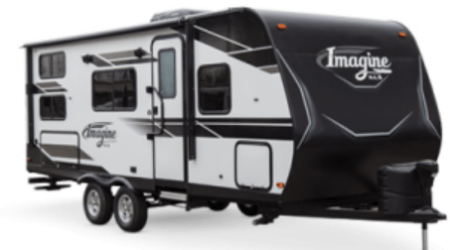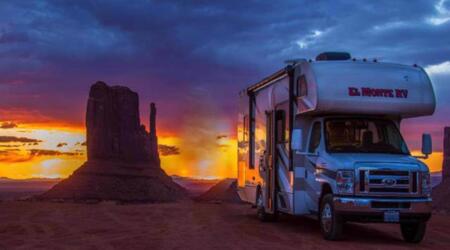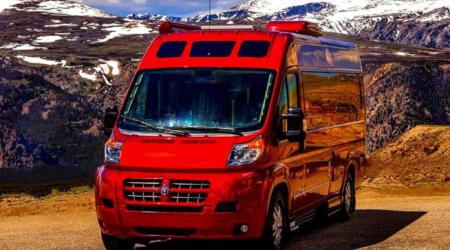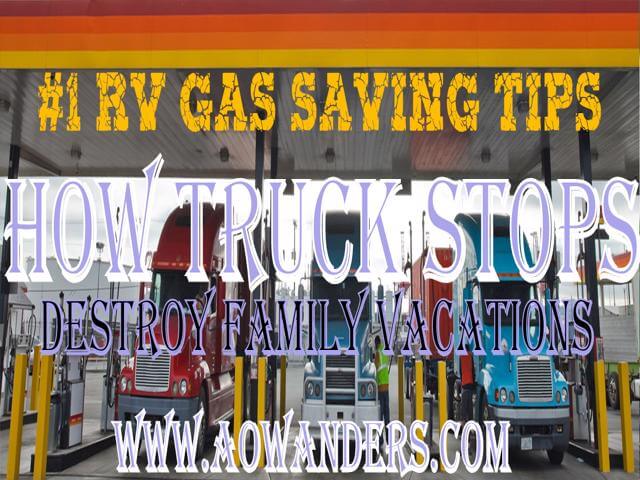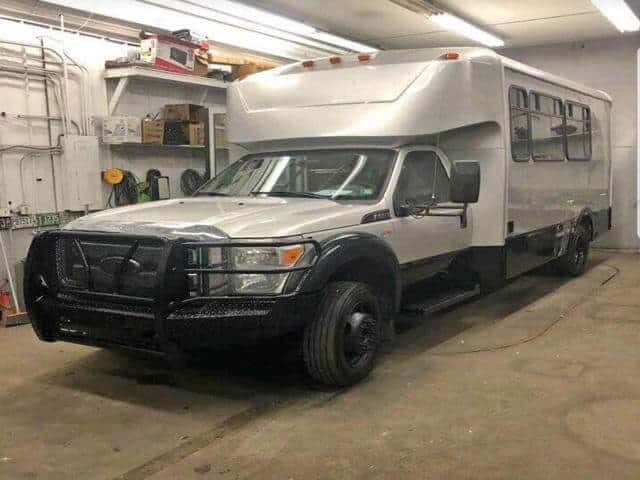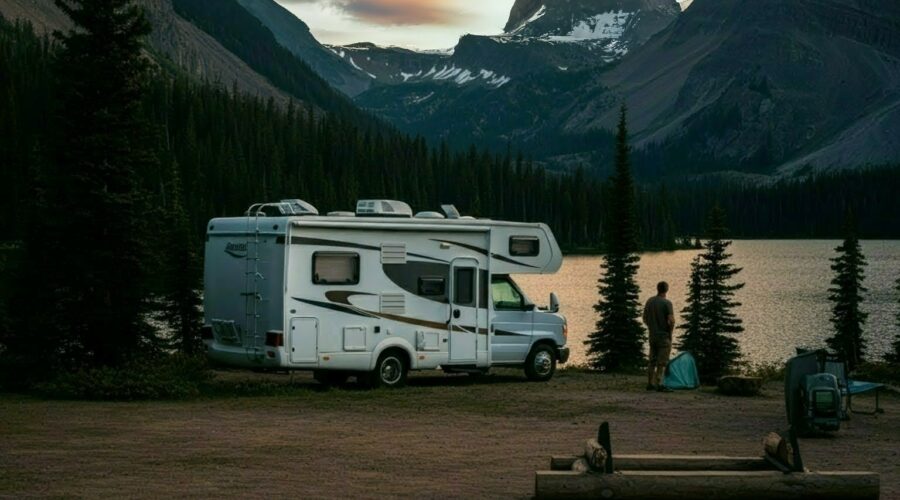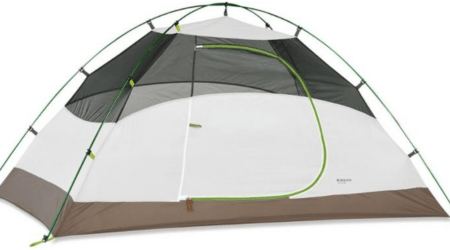Stealthy RV Gas Saving Tips
Quick Reference Table of Contents
It’s hard to become a savvy traveler when you only take one family vacation a year.
This becomes even more challenging when you try something new. Like renting an RV for a family road trip. It takes most RVers years to figure out how to navigate the pitfalls of life on the road. Like campground fees, full RV hookups, camper maintenance, RV memberships, boondocking or even how to pack your camper.
Let alone choosing a destination that your whole family can enjoy. Even simply refueling your RV can be a bit confusing on your first attempt no matter how many RV gas saving tips you read.
With all the different tanks and their own doors its easy to confuse which one is the fuel tank, blackwater tank, freshwater tank or even the propane tank. Unfortunately, I just met a lady who filled her freshwater tank with diesel fuel. I wouldn’t want to be her husband right now. Might have to talk to her about more than just RV gas saving tips. Yikes!!!
When refueling your motorhome you need to pay attention. Not just on which tank your filling, but what gas station your using.
You can find all kinds of RV gas saving tips on the internet. From lowering your RPMs to driving under 55 mph. Using high octane gas along with fuel additives to even how much weight you are packing in your camper. There are even apps like TruckMap to help you plan a fuel-efficient route.
Then there are farfetched urban myths that claim if you drive at night you get better gas mileage because the pavement is harder. I had a guy in Wyoming tell me I would get better RV gas mileage driving in elevation because there is less wind resistance since the air is thinner. Theoretically, I suppose that is true, but I am not going to plan my route driving mountain passes in a rig that is notoriously known for awful gas mileage.
The number one RV gas saving tip I can provide from personal experience is to avoid refueling your motorhome camper at truck stops like the black plague!
Because neighborhood gas stations only authorize $1 before refueling, but truck stops authorize $150-$500 depending on which pump you use. Passenger car gas pumps usually get hit with a $150 pre-authorization charge, and trucker gas pumps pre-authorize $500 at each refueling stop. These pre-authorization holds can tie up you RV road trip money for up to a week!
So when refueling your RV, Camper or motorhome always use the car pumps or a neighborhood gas station. Or better yet go inside and pre-pay for your fuel to avoid unwanted bank holds on your travel funds.
Truck Stop Gas Saving Tips for RVers
Truck stops can destroy a family vacation in less than a second because filling up at the wrong pump can cost you thousands of dollars a day!
Up until a few years ago, I used to rely heavily on routes that supported truck stops for all my RV gas saving tips. While traveling from one destination to the next in my travel trailer.
Until one day when the gas pump declined my card. Attempting to pay for fuel inside the cashier also informed me my card was declined. A bit nervous and scared someone had gotten a hole of my card number I quickly logged into my bank account to see the previous 10 truck stops at placed a $500 hold every time I refueled my rig for a measly $50!!!
I was completely cut off from my road trip funds until the truck stops closed their credit card batches and my financial institution processed the transactions.
After the initial shock and rage wore off I found a spot to post up and call home in the parking lot while I waited for the world of finances to do what they do. I assumed by morning everything would be finalized, but what I was unaware of was that Monday was a banking holiday and my small mountain bank was going to take their sweet ass time.
For 7 days I was denied access to my travel money because $500 worth of gas had put a freeze on $5,000 of my road trip money!
How does this happen? By refueling your RV at the wrong gas station, wrong pump or wrong point of sale. Technologies a pain in the ass sometimes!
RV Gas Saving Travel Hack History
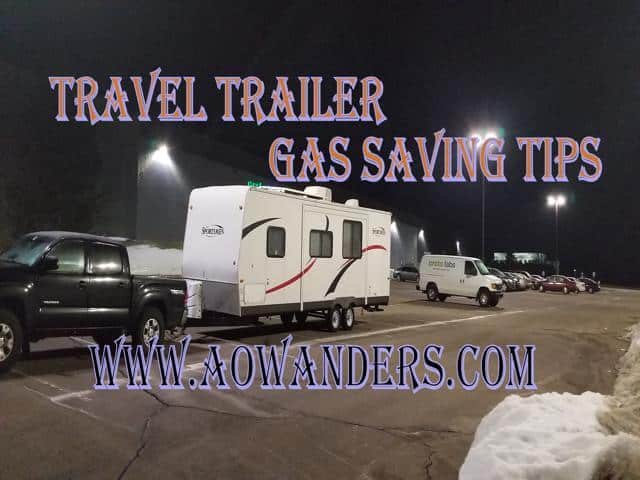 I used to road trip across the country with less than $20 in my bank account, and brag about my RV gas saving tip.
I used to road trip across the country with less than $20 in my bank account, and brag about my RV gas saving tip.
You can still do it today if you’re a savvy traveler like myself, but most people who try are going to incur NSF fees from their bank. Or worse, find themselves stranded in a destination they don’t want to be. Years ago, I had a broke travel friend who needed to drive from Alaska to Florida but only had $40 to his name.
I told him about the RV mistake I made years ago and the RV gas-saving travel hack when low on road trip money I learned from this experience.
Where you pay at the pump and drive as far as you can before the charges catch up with you. Starting on a Friday gives you one free day with no banking transactions. In 5 days he navigated 4,700 miles across two countries and only spent $37!
Banks, fuel stations and technology has caught up to this travel hack. Which brings me to how truck stops can ruin an RV family vacation in less than a second.
How Can Bank Holds Destroy a Family RV Trip
Because of people like me, or others who took my RV gas-saving travel hack a step further by disputing fuel charges and not paying for any of the gas they purchased we now have bank holds.
I recently had the pleasure of interviewing a retired operations manager (let’s call him Bob) for a major gasoline chain about RV gas saving tips, but instead found myself in a conversation about pay-at-the-pump bank holds.
Bob was in charge of fielding customer complaints from around the country regarding their company’s policy on bank holds from fuel purchases. Mainly from road tripping RVers who were following RV gas saving tips they found on the internet.
While Bob has no affiliation with Pilot the gas station at the center of heated RVers debates and complaints he explains Pilot has no ability to place holds on your money. They can only request your bank to actually place a temporary hold on available funds until that branch closes their credit card batches for the day.
Once this happens the responsibility shifts to your financial institution to process the transaction. Depending on the size of your bank, day of the week and even time of the year this process can take up to a week to finalize.
In most cases, the bank hold on your money will be cleared up in 1-2 business days. If you have a small-town bank, as I did, that is behind the times of technology this bank hold from purchasing gas for your RV could last even longer than a week.
The same inconvenience can occur for national banks with branches across the country on busy holiday travel camping weekends like Memorial Day, 4th of July and Labor Day. Don’t forget about other weekends like Sturgis, Burning Man & Coachella who draw massive crowds of people from around the country.
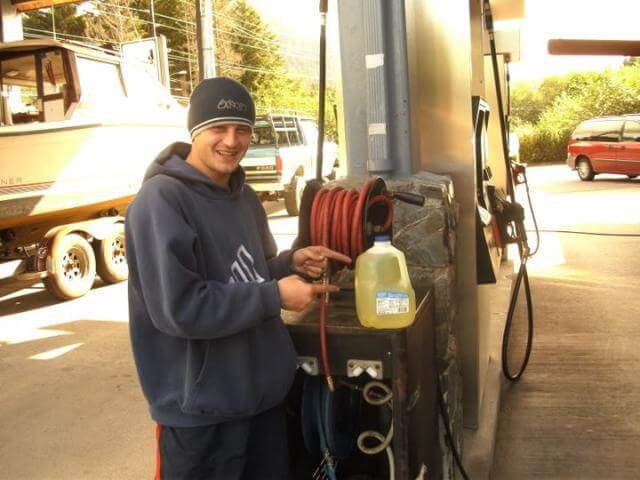 Combine this with the inherently awful gas mileage of your camper you might become an unsuspecting victim during your family RV road trip.
Combine this with the inherently awful gas mileage of your camper you might become an unsuspecting victim during your family RV road trip.
Because while the normal bank request hold for fuel purchases is between $50-$75 for passenger cars.
Pilot Fuel Stations has adopted a new company policy to request a financial hold on fuel purchases of $100-$150 for passenger cars, and $500 for semi-truck pumps.
Most RVers fill up 2-3 times a day. So you can see a bank hold of $100 each time can add up fast, and if you make the mistake of filling your RV up at the semi-truck pumps you could rack up thousands of dollars of bank holds in one day! With no options but to wait for the bank to finalize the transaction of your RV fuel purchase.
Don’t use the semi-truck gas pumps to fill up your RV or you will incur a $500 hold on your bank account!
Gas Saving Tip #2 ~ Inform The Bank of Your Travel Plans
In addition to being out of your normal travel areas while refueling your RV several times a day across vast distances may trigger fraud alarms at your financial institution forcing them to shut your card off!
Before interviewing Bob I met a lady who was stranded in Eastern Montana because she refueled her RV 7 times at Pilot gas stations using the semi-truck gas pumps in one day.
Each fuel purchase was less than $100, but Pilot requested a $500 hold each time for a grand total of $3,500!!! She started out with roughly $3,800, and now had less than $200 her name while she waited for her financial institution to process the transactions.
Luckily for her, she ran into me because I knew of a free campground less than 10 miles away she could stay at for 10 days. Complete with showers, bathroom & even free firewood in Columbus, Montana. Needless to say, she was pretty thankful for not only run into me but that she wasn’t on a time frame either.
How To Avoid Bank Holds When Refueling Your RV
From my backing packing days, I learned all kinds of financial travel hacks. My favorite is using an alternative payment method.
When traveling I have always had some form of online wallet that I only load a limited amount of traveling funds too. Whether that is Paypal, Netspend or prepaid credit cards, and I usually only load up a couple of hundred dollars at a time.
This way if someone steals my wallet or I use an unscrupulous credit card reader thieves don’t have access to all of my travel money.
The same travel hack can be used when road tripping in your RV. Using a secondary payment method or online wallet guarantees that your road trip travel funds won’t be tied up in bank holds because instead of putting a hold on your finances they just limit the amount you can purchase. Usually $50-$75.
Another RV travel hack method to keep your finances available when refueling your motorhome is to not pay at the pump. Walk inside the store and tell them the amount you want to charge.
If you come up short guessing how much your RV needs when refueling the difference gets refunded to you. Instead of waiting on credit card batches to be processed to lift bank holds for 3 or 4 times the amount of what you actually needed. Now you’re simply waiting for banks to process your transactions and refund you a couple of dollars here and there that you didn’t use.
Which would you rather be waiting on? $20 in refunds or $1,500 in bank holds for refueling your RV.
One other way to avoid these vacation killers is to use your debit card. When using your debit card and entering your pin number at the point of sale all transactions occur in real-time.
I was a holdout for a long time before embracing this type of transaction. Who knows where those numbers are being stored and who has access to them, and while that’s not an unfounded fear. Hear in the states things are pretty secure, and banks are quick to side with you regarding any fraudulent charges.
If you are low on funds or want to avoid bank holds when refueling your RV during the family road trip go inside and prepay. This stops the hold and lessens the risk of credit card fraud. Leaving you access to all your travel funds.
Stop Refueling Your RV At Truck Stops
Truck stops are great for what they are, but if your new to RV life on the road truck stops are not where you want to learn your RV lessons.
Truck stops are great for one-night-stand boondocking sessions, filling up on road trip supplies, a quick bite to eat, showers and even navigation tips.
But when it comes to refueling your RV truck stops are a budget killer. Because truckers pump $500 worth of fuel easily, and some motorhomes take $300-$400 to fill their gas tanks. Taking that into account truck stops have had to implement a policy to protect themselves from getting burned by people who can’t pay for the fuel they pump. So most truck stops authorize $500 to refuel your RV if you choose to pay at the pump.
Remember when I told you I have a friend who traveled from Alaska to Florida on only $37? He was able to do that because your local gas station authorizes a trivial amount just to make sure the card is active. Then submits the actual amount at a later date to sort it out with your bank.
Truckstop and other commercial refueling stations have been burned one too many times so they have chosen instead to place a hold on customers’ finances until the transaction are finalized. To ensure they get their money.
Most “neighborhood” gas stations only authorize $1 instead of preauthorizing $500!! Which is how my friend was allowed to drive 4,700 on only $37!!!!
You can find RV gas saving tips and other RV tips by simply following this link to my RV Life category or clicking on this photo





